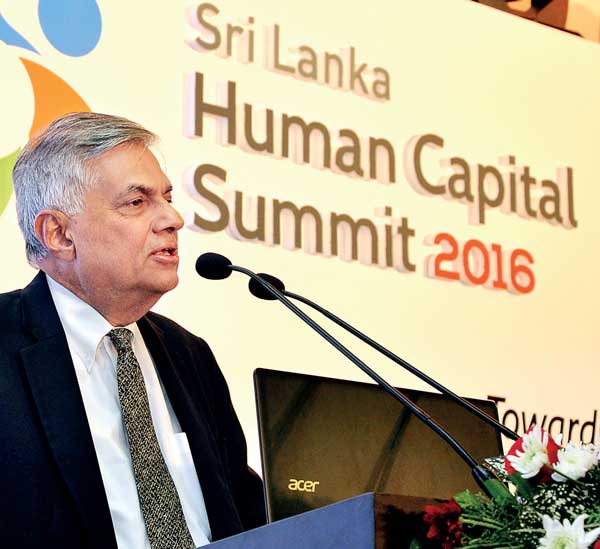29 Aug 2016 - {{hitsCtrl.values.hits}}
 Prime Minister speaking at the Human Capital Summit
Prime Minister speaking at the Human Capital Summit
 The Sri Lanka Human Capital Summit (HCS) served as a platform for a dialogue between policy makers, business leaders, industry experts and global thought leaders. The conference also served as a platform to identify solutions to bridge the skill gaps which would enable Sri Lanka build a future ready workforce.
The Sri Lanka Human Capital Summit (HCS) served as a platform for a dialogue between policy makers, business leaders, industry experts and global thought leaders. The conference also served as a platform to identify solutions to bridge the skill gaps which would enable Sri Lanka build a future ready workforce.
During the sessions, the speakers suggested several initiatives industry leaders and the Sri Lankan government can undertake towards maximizing job opportunities in the
identified sectors.
The speakers emphasized the need to create a formal forum comprising of corporate organizations, government representatives and academia to provide guidance and support in developing the skills for the future. The need to institutionalize the forum and articulate clear roles and responsibilities for the forum was also discussed. A very common issue that was stated across industry pillars is the lack of training in softskills that will help in immediate employment.
A large section of the educated population in Sri Lanka is unemployable due to lack of training in work specific skills. There is a dire need to build communication and soft skills in the workforce. It is also critical to increase the education standards of schools and colleges to help in producing talent that are globally competitive. A key theme that was discussed was on the evaluation mechanism of the training provided through vocational training institutions. It was emphasized that the success of these institutions should be determined by the quality of education and not by the quantity of students graduating. The speakers argued the importance of focusing on Gender Diversity and the importance of attracting more women employees into the workforce. To achieve that there is a need to provide a healthy and an accommodating ecosystem to retain and motivate women. There is also a need to strengthen governance mechanisms and increase transparency in managing compensation of the workforce in industries like tourism, construction and logistics to attract young people into the emerging industries.
The importance of investment in best in class technology and innovation across all sectors was discussed. Sri Lanka today needs to develop a focused strategy and must have a clear vision for developing capabilities in technology. Finally, have in place a mechanism to guide youth to take up opportunities in growth sectors of the National Economy.
Consensus for change
The positive outcome of the Human Capital summit is the general agreement between all the key stakeholders of the urgency to keep upgrading the skills of our workers and adapting those skills to keep up with the pace of change. For the state this is critical to ensure we remain competitive and to attract investments to create new employment opportunities for our workforce.
Then white-collar workers unlike before would have to at their own expense acquire new expertise every few years to be part of the lucrative market for scarce talent. However, to create new opportunities for our country and workers we would require fundamental change in the way we deliver our education and training interventions. The current educational system in our country, from kindergarten through university, does a poor job of equipping people for continuous learning. Therefore, there needs to be a wave of innovation in future education, particularly online and by using robots, that will cater to this need in a more flexible, personalized way, than the current way the traditional degree or postgraduate courses are delivered.
However, for a growing number of workers they will have to take responsibility for their own future by investing in learning and development on a continuous basis. The successful worker of the future will live in clusters of talented, open-minded people and spend a lot of time engaging in thought provoking debate using social media and robots as a vehicle to acquire knowledge and skills.
Way forward
Therefore, Sri Lanka as a country needs to move up this ladder of skills sophistication. To make this transition we require a system that can offer strong general education and training. We need to have a standard level of skills in the work force on which to build a platform and to get the participation of the private actor. Whether public or private, there must be some overarching co-ordination and management knitting together to generate new energy within the education and training system. But as much as the structure of the general education and training system influences levels of private sector participation and public-private co-operation, its focus determines, to a large extent, the type and orientation of the skills and knowledge that will be most prevalent in the local labour force.
For example, we need to reform our education and training system to match the needs of industry, especially MNCs and local companies manufacturing for export and designed to meet the needs of international business by selecting English as the medium of instruction, focusing the curriculum on technology, and explicitly tying vocational education, especially at the tertiary level, to specific industrial sectors and skill needs. Therefore, one solution to ride the next wave of growth lies in education. People should be trained in areas where jobs are plenty.
There are probably many jobs that go elsewhere because people in Sri Lanka don’t have the expertise. Therefore, we need to ensure that post-secondary education becomes more affordable so that people have the opportunity to move into fields were skills are in high demand. For this to happen we need new players to enter the training turf to up-skill the workforce and to help more and more people to get jobs at entry level. From now on Human Resource Development must be included in all economic cooperation agreements. We should start with ECTA.
If we can have Sri Lankan Colleges affiliated to Indian top universities, greater access to IITs then around 150.000 students who do well in ALs who cannot gain admission to our Universities could go to local Colleges approved by the UGC or join the IITs through a scheme. The Colleges will conduct the lectures for the University exam which is the same for University and Colleges.
In the final analysis, if we are to get anywhere from now on we desperately need to push through the reforms this sector desperately needs and also engage competent HR experts and not quacks who don’t have the depth or understand the Human Capital issues Sri Lanka faces currently. In the end, this isn’t about politics. This is about people’s lives and livelihoods. This is about people’s businesses. This is about Sri Lanka’s future, and whether we will be able to look back years from now and say that this was the moment when we made the changes we needed, and gave our children a better life. I believe we can and the time is right now.
(The writer is a thought leader in HR)
10 Jan 2025 1 hours ago
10 Jan 2025 2 hours ago
10 Jan 2025 3 hours ago
10 Jan 2025 3 hours ago
10 Jan 2025 3 hours ago